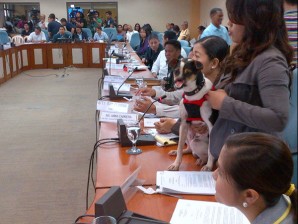
An animal welfare advocate presents Wacku to members of the House committee on revision of rules. KAREN BONCOCAN/INQUIRER.net FILE PHOTO
MANILA, Philippines—There has long been talk of a “Catholic vote” and an “Iglesia ni Cristo vote”— but an “animal vote”?
To ensure the well-being of pets after the elections, the Philippine Animal Welfare Society is set to come up with a “guide” to animal lovers to help them cast “an animal vote” in May.
Anna Cabrera, PAWS executive director, said that the group would be fielding questionnaires containing “five to seven” questions about specific animal issues on April 25, to be answered by candidates for national and local positions in Metro Manila.
She said a list which collates their answers will then be uploaded on PAWS’ Facebook account, which has been made public.
“Like the environmentalists and the others, animal lovers also have issues,” she said. “We want to put up an animal vote. The animal vote can definitely affect (a candidate’s) bid.”
Asked if the group would come up with a list similar to the one initiated by the diocese of Bacolod in Negros Occidental, which categorized candidates into members of Team Patay or Team Buhay depending on their stand on the reproductive health measure, Cabrera laughed and said, “We just want [the candidates] to clarify their vote in public.”
Cabrera, however, gave the names of some candidates running for national positions who she said were assured of this “animal vote” due to their known commitment to the well-being of animals during their terms as government officials.
In the Senate, for example, she said Chiz Escudero and Gringo Honasan, who are both seeking re-election, already have the nod of animal lovers for what Cabrera said was their support of an amendment to the Animal Welfare Act passed in 1998. The amendment sought to include stiffer penalties and longer jail terms for animal abusers.
Incumbent Representative Boyet Gonzales, who is seeking re-election as one of the representatives of Mandaluyong in the House, and incumbent Representatives Bernadette Herrera-Dy and Angelo Palmones, who are campaigning for the Bagong Henerasyon and Agham party-lists, respectively, are also assured of the vote for doing the same, Cabrera said.
She also lauded, among others, the Kabataan Party-list, represented by Raymund Palatino, which is campaigning for re-election, for passing a resolution for public school students not to go on field trips to zoos and marine parks, allegedly oppressive establishments for animals.
While Cabrera did not mention which candidates had “the animal vote” at the local level, she gave the names of two who she said were “definitely” not included in the animal ballot.
She mentioned Manila Mayor Alfredo Lim, who is seeking re-election, because he “refused” to have Mali the elephant relocated to a sanctuary in Thailand.
Animal welfare activists have been pushing for the transfer of the 38-year-old sole elephant from Manila Zoo, citing her need, among others, to be in the company of others elephants. They argued elephants were social animals that suffered if left in isolation.
In January, the proposed transfer drew support from some lawmakers, with the House committee on natural resources passing a resolution in support of it.
Aside from Lim, Cabrera said, incumbent Marikina Councilor Judy Magtubo, who is seeking reelection, did not have the “animal vote” because of her supposed “antipet” stance. Magtubo is the author of Ordinance No. 156, series of 1996, that prohibits residents in resettlement areas from owning pets.
While local officials said that the law prevented animals from staying in areas where their needs may not be taken care of, Cabrera said it “discriminated against” residents in resettlement areas, some of whom are responsible pet owners.
Among the other issues Cabrera said PAWS would seek to clarify through the questionnaire were the candidates’ stand on the spay/neuter program.
Spaying and neutering are procedures for removing the reproductive organs of cats and dogs, among others, to prevent a boom in their population.
PAWS and other animal welfare groups, such as the Compassion and Responsibility for Animals Philippines, believe spaying or neutering animals can prevent the increase in the number of strays and, at the same time, can help them become healthier and less vulnerable to diseases.
She said the other points to be included on the questionnaire have yet to be determined.